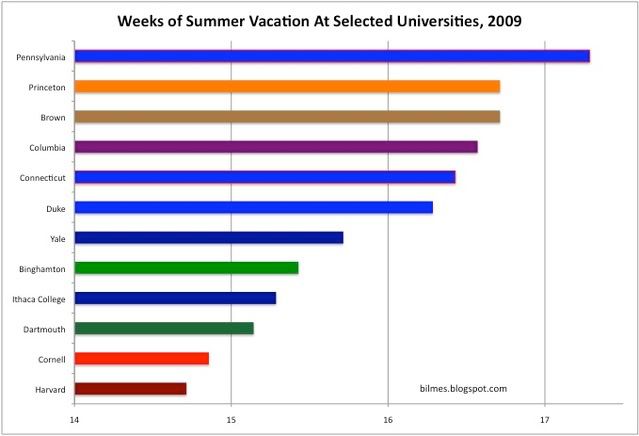But is Cornell's summer break shorter than those of other universities?
Let's do a little research. Looking at the other Ivies plus Duke (which is similar in many ways to Cornell), our neighbor IC, and two area "state" schools (UConn and Binghamton), we find that Cornell's short vacation is trumped only by Harvard's.

Why is Cornell's break so short?
1. Cornell compensates by having an abnormally long, 5-week winter break. This allows the university to save on heating costs by turning down the heat in the dorms, and also to have plenty of time to run a 3-week winter program which doesn't even begin until after January 1. This schedule also allows for a class-free week in January for Greek recruitment.
2. Cornell, even with its long exam period, doesn't end much later than the other schools. But it starts earlier. Our first day of class is August 27. No other Ivy school starts before September, with five Ivies starting after September 7.
3. Cornell's summer break seems even shorter for many students because of New Student Orientation. Freshmen will be heading up with their families around August 20, and thousands of returning students either have commitments during Orientation Week or simply head up to enjoy a week of partying.
Why should summer vacation be extended?
There are plenty of things for Cornell students to do during the summer, but few things to do during the winter break. A longer summer break would enable students to work an extra week, and students would not have to rush so much to begin internships which start in May. Comparatively, it's difficult for a college student to get a job for four weeks over Winter Break, so most Cornell students end up doing nothing with their extra week.
This spring's end date of May 15 was actually early by Cornell's standards. Next year we finish on May 21, and it's May 20 the year after. In comparison, Yale also ended on May 15 this year but will end on May 11 and May 10 the next two years.
How can summer vacation be extended?
To use this coming year's calendar as an example, Cornell could begin its 3-week winter session on Monday, December 28, instead of the following week. The session would then end on January 15, enabling classes to begin on Monday, January 18. Rush week would begin one week early, on January 11. Fast forward to May, and students are done on May 14, not May 21.
Of course, I'm glossing over the logistical nightmares of the scheduling process. It might be difficult to start a 3-week winter session between Christmas and New Year's, and I'm sure Cornell likes saving on heating. Finally, it takes a while to make changes to the academic calendar. (Labor Day was established as a federal holiday in 1894 but it will not be observed at Cornell until 2010).
Wow we were Just talking about this at the freshman send off party in D.C. Cool insights/analysis.
ReplyDeleteI think a lot of scheduling (especially for spring) is centered around Graduation, which is always memorial day weekend. Memorial day is late this year (May 31!), so hence, the late start date.
ReplyDeleteand also, some Ivies (harvard comes to mind) has exams after winter break. I would much happily stay another week at school rather than worry about exams the whole winter break!
ReplyDeleteI don't think many students would be happy about spending an extra winter week in Ithaca, although it would help attendance at home hockey games in January!
ReplyDelete